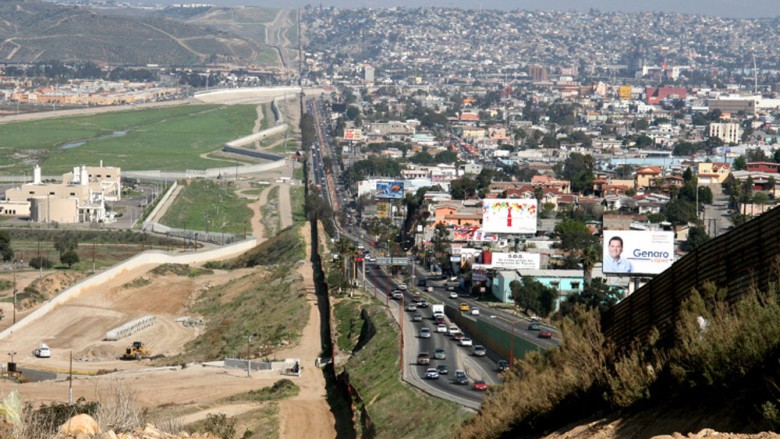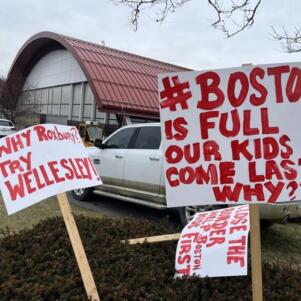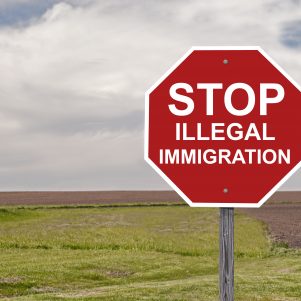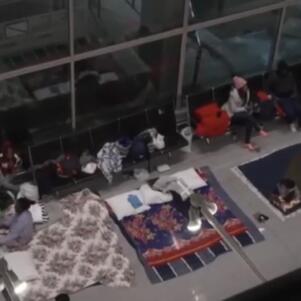Immigration roils passions amid presidential posturing
By Ted Bunker | September 18, 2015, 6:23 EDT
 Border between Tijauana and San Diego. Courtesy of Flickr
Border between Tijauana and San Diego. Courtesy of Flickr Immigration shot to the fore of political debate during the summer thanks largely to Donald Trump. The New York developer called for deporting all illegal aliens, peppering his rhetoric with references to “rapists” and “murderers” and stirring passions on both sides of the issue in the early days of the 2016 presidential primary.
Clearly he’s touched a nerve.
But multiple polls during the past few months show most Americans favor a compassionate and economically rational approach to dealing with the approximately 11 million people in this country who lack permission to be here. Most say they should be given a pathway if not to citizenship then at least legal residence.
Yet surveys also reveal conflicting views – even among Hispanics – over things like stopping further illegal immigration and whether to increase legal immigration levels.
“Some Latinos agree with Trump for the same reason that some Americans agree with Trump,” Jorge Chapa, a Latino studies and government professor at the University of Illinois Urbana-Champaign, said in an interview. Further complicating the matter, the population typically grouped under the categories “Hispanic” and “Latino” in political surveys include Americans whose families came to the U.S. from Spanish-speaking countries centuries ago, as well as recent immigrants from places as different as Mexico, Paraguay, Chile, Cuba, and Puerto Rico (a U.S. territory whose residents are U.S. citizens), to name just a few.
While about a third of Latinos back higher levels of legal immigration, roughly the same proportion would prefer to see levels lowered, according to a recent Gallup Poll. By comparison, two in five Americans overall (including Latinos) favor keeping immigration levels unchanged while a third prefer a reduction and a quarter say there should be an increase.
When it comes to “sanctuary cities,” where local policy requires law enforcement officers to ignore a person’s immigration status, a sharper schism emerges. A recent national poll of Hispanics by McKeon & Associates showed 56 percent back this hands-off approach applied by cities such as Cambridge, Massachusetts, and San Francisco. But 64 percent of Hispanics support Kate’s law, named for Kate Steinle, 32, who was shot dead by an illegal immigrant July 1 while walking with her father on a popular San Francisco pier. The proposal that would mandate five-year prison terms for illegal aliens with felony convictions who have been deported but are arrested – in sanctuary cities or elsewhere – and found guilty of re-entering the U.S. illegally.
Trump has used Steinle’s death to highlight his proposals, one of which is to erect a wall along the entire length of the southern U.S. border, and make Mexico pay for it. Trump also calls for seizing remittances sent by undocumented immigrants in the U.S. to recipients in Mexico, if the money came from illegal wages. That would continue until the Mexican government agreed to finance his border barrier.
Republican opponents describe Trump’s proposals as simplistic. Some experts agree.
“A simplistic solution to a complex problem,” like a border fence, won’t solve America’s illegal immigration difficulties, Chapa said by telephone. “It just won’t work to keep undocumented workers out,” he said. “It’s more likely to keep them in.”
Current policies on undocumented immigrants have created a new underclass, according to Doug Massey, a Princeton University sociologist. “Not since the days of slavery have so many residents of the United States lacked the most basic social, economic, and human rights,” he wrote in 2013.
Some Trump opponents say the New Yorker’s rhetoric does nothing to resolve such problems and would only make things worse.
“Donald Trump has introduced the idea of an immigration system which comes down to the mass deportation of 11 million people at a cost of as much as $600 billion, massive new federal powers to step on the civil liberties of ordinary Americans, and a border plan that could be best described as a fantasy,” the campaign of Jeb Bush has said on its website. Bush, a former Florida governor and the son and brother of former presidents, is married to a Mexican woman, Columba.
“We should look at immigration as a way to build up this country,” Bush has said on the website. “A thoughtful, strategic approach that reflects the values of this nation and that would treat immigration as an economic driver – meeting the needs of our growing economy.”
Although many Americans, like Bush, object to Trump’s inflammatory rhetoric, there remain legitimate political and economic concerns about the unceasing flow of illegal immigration. Some have expressed concern that people who are not citizens of the United States are being permitted to vote in American elections, thus corrupting the process. Others have expressed economic concerns that undocumented workers take low-skilled jobs at the expense of Americans, particularly blacks, and that illegal immigrants put a strain on public coffers when they are allowed to obtain public assistance under the same guidelines as citizens.
Last year, Peter Kirsanow, the head of the U.S. Commission on Civil Rights, wrote to President Barack Obama urging him to reconsider his plan to provide legal status to some 34 million undocumented workers by the end of 2020. Kirsanow said the move would “devastate” black Americans, whose average income remained below pre-recession levels.
One common response to critics of illegal immigration is that the jobs undocumented workers take are those that even less-educated Americans won’t accept. Stanford University economist and syndicated columnist Thomas Sowell has dismissed such claims as nonsense.
“What is missing in this argument is what is crucial in any economic argument: price,” Sowell said in a March 2006 column. “Americans will not take many jobs at their current pay levels — and those pay levels will not rise so long as poverty-stricken immigrants are willing to take those jobs.”
“None of the rhetoric and sophistry that we hear about immigration deals with the plain and ugly reality: Politicians are afraid of losing the Hispanic vote and businesses want cheap labor,” Sowell wrote.
Many of the Republican presidential candidates, including New Jersey Governor Chris Christie, advocate universal application and enforcement of the e-verify system to screen out undocumented applicants for job openings. That way, the competition for low-skilled jobs would be reduced, they say.
“If it’s more expensive to hire someone who is illegal than it is to hire someone who is legal, they’ll hire someone who is legal,” Christie said about American businesses during a town hall-style meeting in New Hampshire Sept. 13.
Ted Cruz, the senator from Texas and the son of a Cuban immigrant, takes a tougher line. According to his website, he “would rescind President Obama’s unconstitutional executive amnesty and cut off all federal funds to sanctuary cities that refuse to enforce immigration laws and cooperate in the capture of illegal immigrants who commit violent crimes.”
Cruz introduced the Kate’s Law bill in Congress in July, and previously proposed barring illegal immigrants from access to government assistance at any level as well as blocking them from any pathways to citizenship.
Florida Senator Marco Rubio, another son of Cuban immigrants, has staked out a position that puts him somewhere in between Bush , on the one hand, and Trump and Cruz, on the other.
“We have millions of people living in this country illegally, many of whom have been here for a decade or longer,” Rubio says on his campaign website. “We need to find a reasonable but responsible way of incorporating them into American life.”
Rubio has called for a pathway to legal residence, while going back and forth on whether undocumented immigrants should be able to achieve citizenship. During the first round of primary debates, Rubio sketched out his current thinking on the issue:
“They will have to pass a background check, they will have to pay a fine, they will have to start paying taxes, they will have to learn English. And in exchange for that what they will get is a work permit, that allows them to legally work in the U.S. and travel. And that’s all they will have for an extended period of time.” Only after that would there be “a conversation” about providing a green card, he said, without mentioning citizenship.
With an estimated 28 million Latino citizens eligible to vote next year, according to the Los Angeles Times, capturing a healthy share of their support may be critical to winning the general election in November. That has led to speculation that Trump’s rhetoric may be poisoning the well for the GOP candidates who use softer rhetoric to appeal to a broader segment of the voting population.
Polls show that while Trump is viewed favorably by 14 percent of Latinos, his negative ratings have soared to 65 percent among that group. Meanwhile, Bush’s favorable score has risen sharply, to 34 percent, the highest among Republican candidates, according to Gallup.
In the meantime, actions at the local level continue to shape the debate. Particularly along the U.S.-Mexico border, steps have been taken to toughen immigration enforcement, such as a 2010 Arizona law that requires police to question anyone suspected of being in the country illegally. Some Hispanic Arizonans have voiced support for the law.
Yet other cities in boarder states have gone the other way. Huntington Park, California (a suburb of Los Angeles) recently decided to allow the appointment of illegal immigrants to city commissions.
Francisco Rivera, a Huntington Park resident, who said he came from Mexico legally, objected to rewarding people who have broken immigration laws.
“I don’t have anything against immigrants. But there’s a difference between ‘immigrant’ and ‘illegal immigrant,’” Rivera told a recent city council meeting. “And I ask myself: what part of ‘illegal’ don’t you guys understand?”
“Not every immigrant that is here is here illegally,” Rivera said. “And that’s the difference. There’s a right way to do things, and a wrong way. People shouldn’t get rewarded by doing the wrong thing. It’s not fair for guys like me. And it’s not fair for other people as well.”











